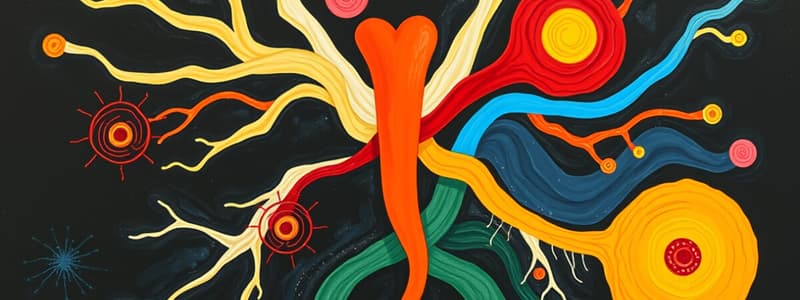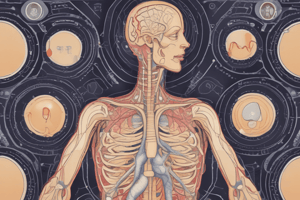Podcast
Questions and Answers
The endocrine system plays a crucial role in bodily changes throughout life, including growth, puberty, and ______.
The endocrine system plays a crucial role in bodily changes throughout life, including growth, puberty, and ______.
reproduction
There are ten hormone-producing glands: three in the brain and seven throughout the ______.
There are ten hormone-producing glands: three in the brain and seven throughout the ______.
body
The thyroid produces triiodothyronine and thyroxine hormones, affecting energy usage and cell ______.
The thyroid produces triiodothyronine and thyroxine hormones, affecting energy usage and cell ______.
efficiency
In men, testosterone from the testes initiates sexual organ development, facial hair growth, voice changes, and ______ increase.
In men, testosterone from the testes initiates sexual organ development, facial hair growth, voice changes, and ______ increase.
In women, ovarian estrogen marks the start of adulthood, leading to hip ______ and uterine lining thickening.
In women, ovarian estrogen marks the start of adulthood, leading to hip ______ and uterine lining thickening.
Hormones are not strictly divided by sex; both men and women have estrogen and ______.
Hormones are not strictly divided by sex; both men and women have estrogen and ______.
Hormones can influence mood by affecting brain chemicals like ______.
Hormones can influence mood by affecting brain chemicals like ______.
The primary function of the endocrine system is regulating bodily processes rather than controlling ______.
The primary function of the endocrine system is regulating bodily processes rather than controlling ______.
Study Notes
Endocrine System Overview
- The endocrine system plays a crucial role in bodily changes throughout life, including growth, puberty, and reproduction.
- It regulates a variety of functions, such as sleep, heart rhythm, and overall cellular activities.
Components of the Endocrine System
- Comprises glands, hormones, and cell receptors that work together for effective regulation.
- There are ten hormone-producing glands: three in the brain and seven throughout the body, surrounded by blood vessels for sourcing hormone ingredients.
Hormone Functionality
- Hormones are released in small quantities into the bloodstream to target specific cells.
- Receptors on or inside cells bind with hormones, instigating changes in cellular behavior that can either enhance or reduce specific functions.
Thyroid Gland Example
- The thyroid produces triiodothyronine and thyroxine hormones, affecting energy usage and cell efficiency.
- Influences vital functions such as breathing rate, heartbeat, body temperature, and digestion.
Hormonal Changes During Puberty
- In men, testosterone from the testes initiates sexual organ development, facial hair growth, voice changes, and height increase.
- In women, ovarian estrogen marks the start of adulthood, leading to hip widening and uterine lining thickening in preparation for menstruation and pregnancy.
Common Misconceptions
- Hormones are not strictly divided by sex; both men and women have estrogen and testosterone, albeit in differing levels.
- These hormones work together with more than ten others to support pregnancy, fetal growth, and maternal care.
Mood Regulation and Hormones
- Hormones can influence mood by affecting brain chemicals like serotonin.
- Chemical level fluctuations may lead to mood changes, but behavior is influenced by a mix of factors including hormones, neurotransmitters, and social conditions.
Endocrine System's Role
- The primary function is regulating bodily processes rather than controlling behavior.
- Influences on hormonal balance may arise from diseases, stress, and diet, impacting hormone production and cellular responses.
Disorders Related to Hormonal Imbalance
- Diabetes is characterized by inadequate insulin production, affecting blood sugar regulation.
- Hyperthyroidism results from excess thyroid hormone, causing symptoms like weight loss and irritability, while hypothyroidism leads to fatigue and depression from insufficient hormone levels.
Regulatory Balance
- Despite potential disruptions, the endocrine system successfully maintains homeostasis in the body, facilitating personal development and changes throughout life.
Endocrine System Overview
- Essential for life changes like growth, puberty, and reproduction.
- Regulates functions such as sleep, heart rhythm, and cellular activities.
Components of the Endocrine System
- Consists of glands, hormones, and cell receptors working in unison.
- Includes ten primary hormone-producing glands: three in the brain, seven in various body locations.
Hormone Functionality
- Hormones enter the bloodstream in small amounts, targeting specific cells.
- Cell receptors bind hormones, triggering changes to enhance or inhibit cellular functions.
Thyroid Gland Example
- Produces triiodothyronine (T3) and thyroxine (T4), impacting energy use and cellular efficiency.
- Regulates vital functions: breathing rate, heartbeat, body temperature, and digestion.
Hormonal Changes During Puberty
- Men experience testosterone surges, leading to development of sexual organs, facial hair, voice deepening, and height increase.
- Women see increased ovarian estrogen, fostering hip widening and uterine lining thickening in preparation for menstruation and possible pregnancy.
Common Misconceptions
- Estrogen and testosterone are present in both sexes, varying by levels rather than existence.
- Over ten hormones collaborate to support pregnancy, fetal development, and maternal care.
Mood Regulation and Hormones
- Hormonal fluctuations can influence mood by altering brain chemicals like serotonin.
- Mood changes stem from a combination of hormones, neurotransmitters, and social circumstances.
Endocrine System's Role
- Primarily regulates bodily processes rather than controlling behavior directly.
- Factors like diseases, stress, and diet can disrupt hormonal balance, affecting production and cellular responses.
Disorders Related to Hormonal Imbalance
- Diabetes arises from insufficient insulin production, disrupting blood sugar levels.
- Hyperthyroidism leads to excess thyroid hormones, causing weight loss and irritability; hypothyroidism results in fatigue and depression from hormone deficiency.
Regulatory Balance
- Despite challenges, the endocrine system effectively maintains homeostasis, facilitating personal growth and changes throughout life.
Studying That Suits You
Use AI to generate personalized quizzes and flashcards to suit your learning preferences.
Description
This quiz provides an overview of the endocrine system, detailing its components, the function of hormones, and their impact on various bodily processes. Explore how glands and hormones work together to regulate important functions like growth and metabolism.




